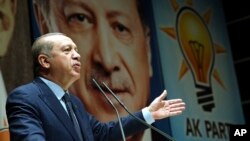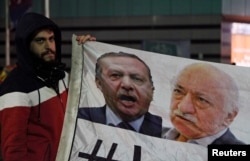The current diplomatic crisis between Turkey and the United States, sparked by the arrest of local U.S. employee Metin Topuz at a diplomatic mission, is underscored by growing fears in Ankara that Washington is conspiring against it.
Turkish President Recep Tayyip Erdogan, in a speech Friday, warned that Turkey is the target of daily attacks and plots, and in a thinly veiled reference to Washington added, "Those who supported terror groups such as the Fethullah Terrorist Organization (FETO) and the PKK failed to corner Turkey ... [and] now are taking direct action."
In its war against Islamic State, Washington is arming the Syrian Kurdish militia YPG. Ankara claims the group is linked to the PKK that has been fighting Turkey for decades and is designated by the U.S. and European Union as a terrorist organization.
Ankara blames FETO for last year's failed coup in Turkey. Its alleged leader, Turkish cleric Fethullah Gulen, lives in the United States and has been subject to what so far have been failed attempts by Turkey to extradite him.
But behind the current war of words and reciprocal restrictions on the issuance of visas between the NATO allies is a pending New York court case.
"First and foremost is the case of Reza Zarrab, the Turkish Iranian so-called businessman, who [allegedly] has been involved in illicit trade with Iran, contravening the American embargo at the time. He is now in jail," said political scientist Cengiz Aktar.
Zarrab allegedly organized a multibillion-dollar scheme to circumvent U.S. sanctions on Iran. U.S. prosecutors say the scheme also has implicated a senior Turkish state bank employee and a former minister.
"On the one hand, you arrest the deputy manager of my bank, who has not committed any crime," Erdogan said Thursday, attacking the U.S. legal probe. "But on the other hand, my citizen [Zarrab] has been in prison in the U.S. for two years without crime, trying to use him as a confessor."
Analysts suggest Ankara fails to understand the limitations of Washington's influence.
"The indictment against the Iranian trader, Zarrab, and then later on, against Turkey's deputy manager of Halkbank, is essentially now being driven by the judiciary in the U.S.," said Sinan Ulgen, visiting scholar at the Carnegie Institute in Brussels. "So the executive .. in accordance with the principles of the independence of the judiciary, has little influence on how this procedure will unfold. And that's something that Turkey's policymakers should take into consideration."
But Ankara views the Zarrab case not as a legal matter, but more as a conspiracy.
"He [Erdogan] believes there is a massive conspiracy against him, and America is part of this, and so is this court case," said Semih Idiz, political columnist for the al-Monitor website.
This case, he added, "has potential political land mines strewn in it as far as the present [Turkish] administration is concerned, in connection with previous allegations of corruption.
Idiz went on to say that three ministers had to resign over those allegations. "And it has also involved the president's son," he added. "And there is the fear within the government and party that this case may revive that all again, especially as we are heading for elections in two years."
In December 2013, Erdogan's government was almost brought down by Turkish prosecutors investigating Zarrab on graft charges that implicated senior ministers and extended to a member of Erdogan's own family.
The probe was shut down, and the prosecutors were arrested and accused of being followers of Gulen. Erdogan claimed the investigation was the first attempt by Gulen to unseat him from power, calling it a "judicial coup attempt."
Pro-Erdogan media have sought to link this month's arrest of U.S. diplomatic employee Topuz to the Zarrab case, producing video allegedly showing Topuz meeting with one of the Turkish prosecutors involved in investigating Zarrab in 2015.
Pro-government media also point out that while the Zarrab case is about to begin, Ankara's year-long demand to extradite Gulen has not even reached the court.
With the Zarrab trial due to start in November in New York, the potential for more damage to already frayed U.S.-Turkish relations is real.
"It does not bode well," warned columnist Idiz, "because the number of names involved [in the case] are likely to grow. And the [court] revelations, if they anger Erdogan and the government again ... will be seen as part of this conspiracy against Turkey and against Erdogan. And the allegations put forward will heighten Americanism here."





